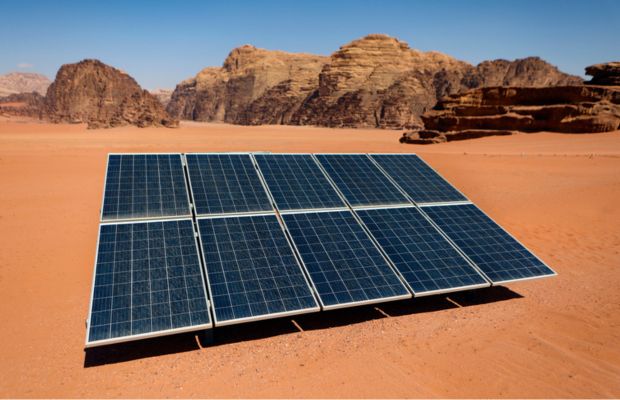Following the National Renewable Energy Program, Saudi Arabia has shortlisted five of 15 domestic and international bidders to construct two photovoltaic solar projects, estimated to be more than $1 billion and having the capacity of 1,500 MW, in the fourth round of auction.
With this, the total awarded renewable energy projects will rise to 11 GW under the program, according to Saudi Power Procurement Co. The firm will purchase the power and manages bidding and development of renewable energy projects.
The firm did not confirm the final dates when the winners will be announced. The firm said that a consortium led by Chinese independent power producer and developer Jinko Power was shortlisted for the 400-MW Tabarjal solar PV project, located roughly 200 km west of the capital Riyadh. The consortium quoted a price of 1.7 US cents per kWh. Other members in the group are Sun Glare Holding Ltd and Sunlight Energy Holding.
Abu Dhabi’s energy firm, Masdar, as a member of consortium of France’s EDF Renouvelables SA and Saudi Arabia’s Nesma Co Ltd, also was shortlisted as second bidder for that project with the price quotation of 1.9 US cents per kWh.
Saudi Power Procurement has also shortlisted two consortia to develop the 1,100-MW Al Henakiyah solar PV project, 577 km west of Riyadh. The Masdar group has quoted the lowest price of 1.68 US cents ahead of the Jinko Power-led consortium’s 1.71 US cents per kWh.
It may be noted that in December 2022 Saudi Power Procurement floated a request for proposals for the latest fourth auction of the projects. Now, after nine months, the firm has shortlisted the bidders for the latest solar PV round.
It is reported that they are 100% owned by the independent power producers and are backed by 25-year power purchase agreements with Saudi Power Procurement. Earlier, it concluded contracts for round three of the auction for four other solar PV projects with a combined capacity of 1,200 MW.
Saudi Arabia has ambitious plans to ramp up renewable energy generation to at least 50% by 2030, under its Vision 2030 strategy and reduce its dependence on oil.


